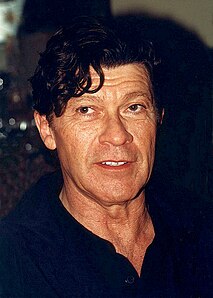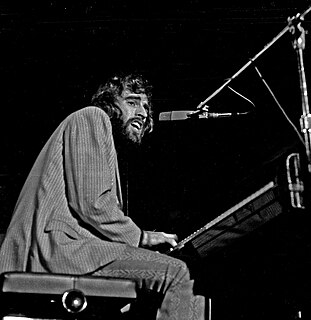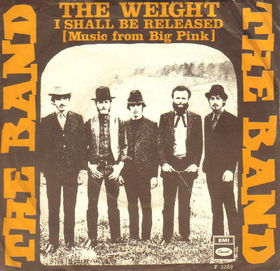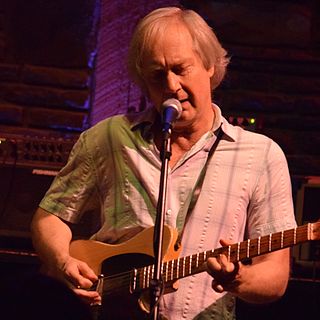
The Band was a Canadian-American rock band formed in Toronto, Ontario, in 1967. It consisted of four Canadians and one American: Rick Danko, Garth Hudson, Richard Manuel, Robbie Robertson, and Levon Helm. The Band combined elements of Americana, folk, rock, jazz, country, and R&B, influencing subsequent musicians such as Elton John, the Grateful Dead, Eric Clapton and Wilco.

Jaime Royal "Robbie" Robertson, OC, is a Canadian musician. He is best known for his work as lead guitarist and songwriter for the Band, and for his career as a solo recording artist. With the deaths of Richard Manuel in 1986, Rick Danko in 1999, and Levon Helm in 2012, Robertson is one of only two living original members of the Band, with the other being Garth Hudson.

"The Night They Drove Old Dixie Down" is a song written by Robbie Robertson and originally recorded by the Canadian-American roots rock group the Band in 1969 and released on their eponymous second album. Levon Helm provided the lead vocals. The song is a first-person narrative relating the economic and social distress experienced by the protagonist, a poor white Southerner, during the last year of the American Civil War, when George Stoneman was raiding southwest Virginia. The song appeared at number 245 on Rolling Stone magazine's list of the 500 greatest songs of all time.

Richard Clare Danko was a Canadian musician, bassist, songwriter, and singer, best known as a founding member of The Band, for which he was inducted into the Rock and Roll Hall of Fame in 1994.

Mark Lavon "Levon" Helm was an American musician who achieved fame as the drummer and one of the three lead vocalists for The Band, for which he was inducted into the Rock and Roll Hall of Fame in 1994. Helm was known for his deeply soulful, country-accented voice, multi-instrumental ability, and creative drumming style, highlighted on many of the Band's recordings, such as "The Weight", "Up on Cripple Creek", and "The Night They Drove Old Dixie Down".

Ronald Cornett Hawkins OC was an American-Canadian singer-songwriter whose career spanned more than half a century. His career began in Arkansas, United States, where he was born and raised. He found success in Ontario, Canada, and lived there for most of his life. He was highly influential in the establishment and evolution of rock music in Canada.

Richard George Manuel was a Canadian singer, multi-instrumentalist, and songwriter, best known as a pianist and one of three lead singers in The Band, for which he was posthumously inducted into the Rock and Roll Hall of Fame in 1994.

Eric "Garth" Hudson is a Canadian multi-instrumentalist best known as the keyboardist and occasional saxophonist for rock group the Band, for which he was inducted into the Rock and Roll Hall of Fame in 1994. He was a principal architect of the group's sound, described as "the most brilliant organist in the rock world" by Keyboard magazine. With the deaths of Richard Manuel in 1986, Rick Danko in 1999, and Levon Helm in 2012, Hudson is one of only two living original members of the Band, with the other being Robbie Robertson.

The Last Waltz was a concert by the Canadian-American rock group The Band, held on American Thanksgiving Day, November 25, 1976, at Winterland Ballroom in San Francisco. The Last Waltz was advertised as The Band's "farewell concert appearance", and the concert had The Band joined by more than a dozen special guests, including their previous employers Ronnie Hawkins and Bob Dylan, as well as Paul Butterfield, Bobby Charles, Eric Clapton, Neil Diamond, Dr. John, Joni Mitchell, Van Morrison, Ringo Starr, Muddy Waters, Ronnie Wood, and Neil Young. The musical director for the concert was The Band's original record producer, John Simon.

Northern Lights – Southern Cross is the sixth studio album by Canadian-American rock group the Band, released in 1975. It was the first album to be recorded at their new California studio, Shangri-La, and the first album of all new material since 1971's Cahoots. All eight songs are credited as compositions of guitarist Robbie Robertson.

Jericho is the eighth studio album by Canadian-American rock group the Band. Coming seventeen years after their "farewell concert", it was released in 1993 and was the first album to feature the latter-day configuration of the group, as well as their first release for the Rhino subsidiary Pyramid Records.

"The Weight" is a song by the Canadian-American group the Band that was released as a single in 1968 and on the group's debut album Music from Big Pink. It was their first release under this name, after their previous releases as Canadian Squires and Levon and the Hawks. Written by Band member Robbie Robertson, the song is about a visitor's experiences in a town mentioned in the lyric's first line as Nazareth. "The Weight" has significantly influenced American popular music, having been listed as No. 41 on Rolling Stone's 500 Greatest Songs of All Time published in 2004. Pitchfork Media named it the 13th best song of the Sixties, and the Rock and Roll Hall of Fame named it one of the 500 Songs that Shaped Rock and Roll. PBS, which broadcast performances of the song in Ramble at the Ryman (2011), Austin City Limits (2012), and Quick Hits (2012), describes it as "a masterpiece of Biblical allusions, enigmatic lines and iconic characters" and notes its enduring popularity as "an essential part of the American songbook."

Larry Campbell is an American multi-instrumentalist who plays many stringed instruments in genres including country, folk, blues, and rock. He is perhaps best known for his time as part of Bob Dylan's Never Ending Tour band from 1997 to 2004.

Fred F. Carter Jr. was an American guitarist, singer, producer and composer.
"This Wheel's on Fire" is a song written by Bob Dylan and Rick Danko. It was originally recorded by Dylan and the Band during their 1967 sessions, portions of which comprised the 1975 album, The Basement Tapes. The Band's own version appeared on their 1968 album, Music from Big Pink. Live versions by the Band appear on their 1972 live double album Rock of Ages, as well as the more complete four-CD-DVD version of that concert, Live at the Academy of Music 1971, and the 2002 Box Set of The Last Waltz.

James Jeffrey Weider is an American guitarist, best known for his work with the Band. He joined the reformed version of the Band in 1985 to replace original guitarist Robbie Robertson.
The Cate Brothers are an American singer-songwriter-musician duo of twin brothers from Fayetteville, Arkansas, Earl and Ernest "Ernie" Cate. In the mid-1960s, they became performers of country soul music at clubs and dances in Arkansas and elsewhere in the mid-South of the United States. Both brothers are singers, with Earl playing guitar and Ernie playing piano. They were recording artists during the mid- to late-1970s and again from the mid-1990s through the first decade of the 2000s.
"Chest Fever" is a song recorded by the Band on its 1968 debut, Music from Big Pink. It is, according to Peter Viney, a historian of the group, the album track that has appeared on the most subsequent live albums and compilations, second only to "The Weight".
"King Harvest " is a song by The Band, which originally appeared as the final track on their second album, The Band.
"Daniel and the Sacred Harp" is a song written by Robbie Robertson that was first released by The Band on their 1970 album Stage Fright. It has been covered by such artists as Barrence Whitfield.















